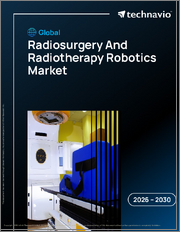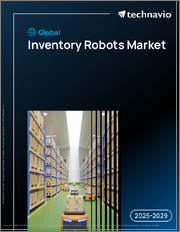
|
시장보고서
상품코드
1898234
로봇 시장 : 시장 규모, 점유율, 성장 분석 - 유형별, 이동성별, 컴포넌트별, 도입 형태별, 환경별, 용도별, 최종 사용자별, 지역별 업계 예측(2026-2033년)Robotics Market Size, Share, and Growth Analysis, By Type (Industrial Robots), By Mobility (Mobile Robotics, Fixed Robotics), By Component, By Deployment, By Environment, By Application, By End-User, By Region - Industry Forecast 2026-2033 |
||||||
세계의 로봇 시장 규모는 2024년에 465억 7,000만 달러로 평가되었고, 2025년 544억 9,000만 달러에서 2033년까지 1,913억 3,000만 달러로 성장할 전망입니다. 예측 기간(2026-2033년) CAGR은 17%로 성장이 예측되고 있습니다.
세계의 로봇 시장 성장은 제조업, 의료, 물류, 농업, 방위 등 다양한 산업에서의 자동화, 인공지능, 센서 기술의 현저한 진보에 의해 견인되고 있습니다. 특히 자동차 및 전자기기 분야에서 산업 자동화의 확대 경향이 로봇 솔루션 수요를 촉진하고 있습니다. 협동 로봇(코봇)은 적당한 가격, 통합의 용이성, 안전한 인간과의 상호작용 능력을 통해 중소기업에 특히 선호됩니다. 또한 의료 수술, 노인 간호, 창고 자동화, 배송 서비스 등의 분야에서 서비스 로봇의 도입이 증가하고 있습니다. 아시아태평양은 중국, 일본, 한국 등의 국가에서 견조한 수요가 있어 시장에서 현저한 점유율을 차지하고 있지만, 북미 및 유럽도 혁신과 규제면의 지원으로 강한 도입 경향을 보이고 있습니다.
세계의 로봇 시장 성장 촉진요인
세계의 로봇 시장은 다양한 산업 분야에서 생산성 향상, 인적 실수 최소화, 운영 비용 절감에 대한 수요 증가를 원동력으로 현저한 성장을 이루고 있습니다. 특히 자동차, 전자기기, 포장 업계 등의 제조, 창고 관리, 조립 라인 등의 분야에서는 신속한 납기 대응, 정밀도 향상, 24시간 연속 가동을 실현하기 위해 로봇에 의한 자동화 도입이 가속화되고 있습니다. 또한 인건비 상승과 숙련 노동자의 감소에 따라 로봇 기술에 의한 산업 자동화의 도입은 변화하는 경제 환경에서 경쟁력을 유지하고자 하는 기업에 대한 전략적 필요로 부상하고 있습니다.
세계의 로봇 시장 성장 억제요인
세계의 로봇 시장은 로봇 시스템 도입에 필요한 많은 투자를 통해 과제에 직면하고 있습니다. 여기에는 하드웨어, 소프트웨어, 통합 및 기존 인프라에 필요한 변경과 관련된 비용이 포함됩니다. AI와 각종 센서를 탑재한 고도의 로봇의 고가격은 잠재적인 구매자에게 장벽이 될 수 있습니다. 또한 지속적인 유지보수, 소프트웨어 업그레이드, 예비 부품 및 문제해결로 총소유비용(TCO)이 더욱 높아집니다. 이 상황은 일반적으로 제한된 예산과 규모의 경제를 달성하기 위해 제약에 직면하는 중소기업(SME)에 특히 어려움을 겪습니다. 결과적으로 개발도상지역과 신흥 부문의 많은 잠재적인 사용자들은 투자이익률(ROI)에 대한 우려로 로봇 기술의 채택을 망설이고 있습니다.
세계의 로봇 시장 동향
세계의 로봇 시장에서는 협동 로봇(코봇)의 도입이 현저하게 증가하고 있으며, 자동화 및 인간 노동자의 연계 방법에 새로운 정의를 가져오고 있습니다. 기존의 산업용 로봇이 인간 오퍼레이터와의 분리를 필요로 하는 것과 달리 코봇은 안전한 공존을 전제로 설계되어 자동차, 전자기기, 식품음료, 금속가공 등 다양한 분야에서 원활한 연계를 가능하게 합니다. 그 인기 증가는 사용자 친화적인 설치, 유연한 프로그래밍, 컴팩트한 설계 등의 특성 외에도 힘 제한 기능이 있는 관절과 인간의 존재를 감지하여 안전성을 높이는 지능형 센서 등 첨단 기능에 기인하고 있습니다. 이 협동형 자동화의 조류는 세계적으로 업무 효율과 생산성을 변화시킬 것으로 전망됩니다.
자주 묻는 질문
목차
서문
- 조사 목적
- 조사 범위
- 정의
조사 방법
- 정보 조달
- 2차 및 1차 데이터의 방법
- 시장 규모 예측
- 시장의 전제조건 및 제한
주요 요약
- 세계 시장 전망
- 공급 및 수요 동향 분석
- 부문별 기회 분석
시장 역학 및 전망
- 시장 규모
- 시장 역학
- 성장 촉진요인 및 기회
- 성장 억제요인 및 과제
- Porter's Five Forces 분석
주요 시장 인사이트
- 중요 성공 요인
- 시장에 영향을 미치는 요인
- 주요 투자 기회
- 시장 생태계
- 시장의 매력 지수(2025년)
- 기술 분석
- 거시경제지표
- 밸류체인 분석
- 규제 상황
- 사례 연구
- 가격 분석
- PESTEL 분석
- 사례 연구
- 스타트업 분석
세계의 로봇 시장 규모 : 유형별 CAGR(2026-2033년)
- 산업용 로봇
- 관절식 로봇
- 스칼라 로봇
- 직교 로봇
- 협동 로봇(코봇)
- 기타
- 서비스 로봇
- 상업용 서비스 로봇
- 퍼스널 및 가정용 서비스 로봇
- 이동 로봇
- 자율 이동 로봇(AMR)
- 자동 반송차(AGV)
- 드론(UAV)
세계의 로봇 시장 규모 : 이동성별 CAGR(2026-2033년)
- 이동형 로봇
- 고정형 로봇
세계의 로봇 시장 규모 : 컴포넌트별 CAGR(2026-2033년)
- 하드웨어
- 센서
- 액추에이터
- 제어 유닛
- 기타
- 소프트웨어
- 로봇 운영 체제
- 네비게이션 매핑
- 기타
- 서비스
- 시스템 통합
- 보수 및 서포트
- 교육 및 컨설팅
- 기타
세계의 로봇 시장 규모 : 도입 형태별 CAGR(2026-2033년)
- 클라우드 기반형 로봇
- 온프레미스형 로봇
세계의 로봇 시장 규모 : 환경별 CAGR(2026-2033년)
- 공중
- 지상
- 해양
세계의 로봇 시장 규모 : 용도별 CAGR(2026-2033년)
- 자재 관리
- 조립 및 분해
- 용접 및 납땜
- 디스펜싱 및 가공
- 보안 및 검사
- 청소 및 소독
- 퍼스널 어시스턴트
- 기타
세계의 로봇 시장 규모 : 최종 사용자별 CAGR(2026-2033년)
- 가정용 및 일반 가정용
- 바닥 청소
- 잔디 청소
- 풀 청소
- 창 청소
- 기타
- 산업용
- 자동차
- 전기 및 전자 기기
- 식품 및 음료
- 의약품 및 바이오테크놀러지
- 기타
- 의료 및 헬스케어
- 수술
- 진단
- 기타
- 농업 및 농업 관련
- 소매 및 호스피탈리티
- 물류 및 창고업
- 군 및 방위
- 건설 및 인프라
- 선박
- 교육
- 스포츠 및 엔터테인먼트
- 기타
세계의 로봇 시장 규모 : 지역별 CAGR(2026-2033년)
- 북미
- 미국
- 캐나다
- 유럽
- 독일
- 스페인
- 프랑스
- 영국
- 이탈리아
- 기타 유럽
- 아시아태평양
- 중국
- 인도
- 일본
- 한국
- 기타 아시아태평양
- 라틴아메리카
- 브라질
- 기타 라틴아메리카
- 중동 및 아프리카
- GCC 국가
- 남아프리카
- 기타 중동 및 아프리카
경쟁 정보
- 상위 5개사 비교
- 주요 기업의 시장 포지셔닝(2025년)
- 주요 시장 기업이 채용한 전략
- 최근 시장 동향
- 기업의 시장 점유율 분석(2025년)
- 주요 기업의 기업 프로파일
- 기업의 상세
- 제품 포트폴리오 분석
- 기업의 부문별 점유율 분석
- 수익의 전년 대비 비교(2023-2025년)
주요 기업 프로파일
- Intuitive Surgical Operations,Inc
- ABB
- Ecovacs
- RoboAds Inc.
- Kuka
- Simbe Robotics
- DJI
- Kawasaki
- Omron Adept
- SMP Robotics
- FANUC Corporation
- iRobot
- Dematic
- Mitsubishi
- Xenex Disinfection Services Inc
- Roborock
- Blue Ocean Robotics
- Brain Corporation
- Zebra Technologies Corp
- Honeywell International Inc
결론 및 권고
AJY 26.01.16Global Robotics Market size was valued at USD 46.57 Billion in 2024 and is poised to grow from USD 54.49 Billion in 2025 to USD 191.33 Billion by 2033, growing at a CAGR of 17% in the forecast period (2026-2033).
The global robotics market is driven by significant advancements in automation, artificial intelligence, and sensor technologies across various industries, including manufacturing, healthcare, logistics, agriculture, and defense. The growing trend towards industrial automation, especially within the automotive and electronics sectors, propels demand for robotic solutions. Collaborative robots (cobots) are particularly favored by small and medium enterprises for their affordability, ease of integration, and safe human interaction capabilities. Additionally, the deployment of service robots is on the rise in fields such as medical surgery, eldercare, warehouse automation, and delivery services. The Asia-Pacific region commands a notable share of the market, with robust demand in countries like China, Japan, and South Korea, while North America and Europe also exhibit strong adoption due to innovation and regulatory support.
Top-down and bottom-up approaches were used to estimate and validate the size of the Global Robotics market and to estimate the size of various other dependent submarkets. The research methodology used to estimate the market size includes the following details: The key players in the market were identified through secondary research, and their market shares in the respective regions were determined through primary and secondary research. This entire procedure includes the study of the annual and financial reports of the top market players and extensive interviews for key insights from industry leaders such as CEOs, VPs, directors, and marketing executives. All percentage shares split, and breakdowns were determined using secondary sources and verified through Primary sources. All possible parameters that affect the markets covered in this research study have been accounted for, viewed in extensive detail, verified through primary research, and analyzed to get the final quantitative and qualitative data.
Global Robotics Market Segments Analysis
Global Robotics Market is segmented By Type, By Mobility, By Component, By Deployment, By Environment, By Application, By End-User and region. Based on By Type, the market is segmented into Industrial Robots,Service Robotsand Mobile Robots. Based on By Mobility, the market is segmented into Mobile Robotics and Fixed Robotics. Based on By Component, the market is segmented into Hardware, Software and Services. Based on By Deployment, the market is segmented into Cloud-based robotics and On-premises robotics. Based on By Environment, the market is segmented into Aerial, Ground and Marine. Based on By Application, the market is segmented into Material Handling, Assembling & Disassembling, Welding & Soldering, Dispensing & Processing, Security & Inspection, Cleaning & Sanitization, Personal Assistance and Others. Based on By End-User, the market is segmented into Domestic/Household, Industrial, Medical & Healthcare, Farming and Agriculture, Retail and Hospitality, Logistics & Warehousing, Military & Defense, Construction & Infrastructure, Marine, Education, Sports & Entertainment and Others. Based on region, the market is segmented into North America, Europe, Asia Pacific, Latin America and Middle East & Africa.
Driver of the Global Robotics Market
The global robotics market is experiencing significant growth driven by the rising demand for enhanced productivity, minimized human error, and reduced operational expenses across various industries. Sectors like manufacturing, warehousing, and assembly lines, particularly in automotive, electronics, and packaging, are increasingly adopting robotic automation to achieve faster turnaround times, improved precision, and continuous operations around the clock. Additionally, as labor costs escalate and the availability of skilled workers decreases, implementing industrial automation through robotics has emerged as a strategic imperative for businesses seeking to remain competitive in an evolving economic landscape.
Restraints in the Global Robotics Market
The Global Robotics market faces challenges due to the substantial initial investments required for deploying robotic systems. This encompasses costs related to hardware, software, integration, and necessary changes to existing infrastructure. The high prices associated with advanced robots featuring AI and various sensors can be a barrier for potential buyers. Additionally, the total cost of ownership escalates with ongoing maintenance, software upgrades, spare parts, and troubleshooting. This situation poses particular difficulties for small and medium-sized enterprises (SMEs) that typically have limited budgets and face constraints in achieving economies of scale. Consequently, many potential users in developing regions or emerging sectors hesitate to adopt robotic technologies because of concerns regarding their return on investment (ROI).
Market Trends of the Global Robotics Market
The Global Robotics market is witnessing a significant surge in the adoption of collaborative robots, commonly known as cobots, which are redefining the way automation integrates with human workers. Unlike traditional industrial robots that necessitate separation from human operators, cobots are engineered for safe coexistence, enabling seamless interaction across various sectors, including automotive, electronics, food and beverage, and metal fabrication. Their growing popularity stems from attributes such as user-friendly installation, adaptable programming, and compact design, alongside advanced features like force-limited joints and intelligent sensors that enhance safety by detecting human presence. This trend toward collaborative automation is set to transform operational efficiencies and productivity on the global stage.
Table of Contents
Introduction
- Objectives of the Study
- Scope of the Report
- Definitions
Research Methodology
- Information Procurement
- Secondary & Primary Data Methods
- Market Size Estimation
- Market Assumptions & Limitations
Executive Summary
- Global Market Outlook
- Supply & Demand Trend Analysis
- Segmental Opportunity Analysis
Market Dynamics & Outlook
- Market Overview
- Market Size
- Market Dynamics
- Drivers & Opportunities
- Restraints & Challenges
- Porters Analysis
- Competitive rivalry
- Threat of substitute
- Bargaining power of buyers
- Threat of new entrants
- Bargaining power of suppliers
Key Market Insights
- Key Success Factors
- Market Impacting Factor
- Top Investment Pockets
- Market Ecosystem
- Market Attractiveness Index, 2025
- Technological Analysis
- Macro-Economic Indicators
- Value Chain Analysis
- Regulatory Landscape
- Case Study
- Pricing Analysis
- PESTLE Analysis
- Case Study
- Startup Analysis
Global Robotics Market Size by Type & CAGR (2026-2033)
- Market Overview
- Industrial Robots
- Articulated Robots
- SCARA Robots
- Cartesian Robots
- Collaborative Robots (Cobots)
- Others
- Service Robots
- Professional Service Robots
- Personal/Domestic Service Robots
- Mobile Robots
- Autonomous Mobile Robots (AMRs)
- Automated Guided Vehicles (AGVs)
- Drones (UAVs)
Global Robotics Market Size by Mobility & CAGR (2026-2033)
- Market Overview
- Mobile Robotics
- Fixed Robotics
Global Robotics Market Size by Component & CAGR (2026-2033)
- Market Overview
- Hardware
- Sensors
- Actuators
- Control Units
- Others
- Software
- Robot Operating Systems
- Navigation & Mapping
- Others
- Services
- System Integration
- Maintenance & Support
- Training & Consulting
- Others
Global Robotics Market Size by Deployment & CAGR (2026-2033)
- Market Overview
- Cloud-based robotics
- On-premises robotics
Global Robotics Market Size by Environment & CAGR (2026-2033)
- Market Overview
- Aerial
- Ground
- Marine
Global Robotics Market Size by Application & CAGR (2026-2033)
- Market Overview
- Material Handling
- Assembling & Disassembling
- Welding & Soldering
- Dispensing & Processing
- Security & Inspection
- Cleaning & Sanitization
- Personal Assistance
- Others
Global Robotics Market Size by End-User & CAGR (2026-2033)
- Market Overview
- Domestic/Household
- Floor Cleaning
- Lawn Cleaning
- Pool Cleaning
- Window Cleaning
- Others
- Industrial
- Automotive
- Electrical & Electronics
- Food & Beverages
- Pharmaceuticals and Biotech
- Others
- Medical & Healthcare
- Surgery
- Diagnostics
- Others
- Farming and Agriculture
- Retail and Hospitality
- Logistics & Warehousing
- Military & Defense
- Construction & Infrastructure
- Marine
- Education
- Sports & Entertainment
- Others
Global Robotics Market Size & CAGR (2026-2033)
- North America (By Type, By Mobility, By Component, By Deployment, By Environment, By Application, By End-User)
- US
- Canada
- Europe (By Type, By Mobility, By Component, By Deployment, By Environment, By Application, By End-User)
- Germany
- Spain
- France
- UK
- Italy
- Rest of Europe
- Asia Pacific (By Type, By Mobility, By Component, By Deployment, By Environment, By Application, By End-User)
- China
- India
- Japan
- South Korea
- Rest of Asia-Pacific
- Latin America (By Type, By Mobility, By Component, By Deployment, By Environment, By Application, By End-User)
- Brazil
- Rest of Latin America
- Middle East & Africa (By Type, By Mobility, By Component, By Deployment, By Environment, By Application, By End-User)
- GCC Countries
- South Africa
- Rest of Middle East & Africa
Competitive Intelligence
- Top 5 Player Comparison
- Market Positioning of Key Players, 2025
- Strategies Adopted by Key Market Players
- Recent Developments in the Market
- Company Market Share Analysis, 2025
- Company Profiles of All Key Players
- Company Details
- Product Portfolio Analysis
- Company's Segmental Share Analysis
- Revenue Y-O-Y Comparison (2023-2025)
Key Company Profiles
- Intuitive Surgical Operations,Inc
- Company Overview
- Business Segment Overview
- Financial Updates
- Key Developments
- ABB
- Company Overview
- Business Segment Overview
- Financial Updates
- Key Developments
- Ecovacs
- Company Overview
- Business Segment Overview
- Financial Updates
- Key Developments
- RoboAds Inc.
- Company Overview
- Business Segment Overview
- Financial Updates
- Key Developments
- Kuka
- Company Overview
- Business Segment Overview
- Financial Updates
- Key Developments
- Simbe Robotics
- Company Overview
- Business Segment Overview
- Financial Updates
- Key Developments
- DJI
- Company Overview
- Business Segment Overview
- Financial Updates
- Key Developments
- Kawasaki
- Company Overview
- Business Segment Overview
- Financial Updates
- Key Developments
- Omron Adept
- Company Overview
- Business Segment Overview
- Financial Updates
- Key Developments
- SMP Robotics
- Company Overview
- Business Segment Overview
- Financial Updates
- Key Developments
- FANUC Corporation
- Company Overview
- Business Segment Overview
- Financial Updates
- Key Developments
- iRobot
- Company Overview
- Business Segment Overview
- Financial Updates
- Key Developments
- Dematic
- Company Overview
- Business Segment Overview
- Financial Updates
- Key Developments
- Mitsubishi
- Company Overview
- Business Segment Overview
- Financial Updates
- Key Developments
- Xenex Disinfection Services Inc
- Company Overview
- Business Segment Overview
- Financial Updates
- Key Developments
- Roborock
- Company Overview
- Business Segment Overview
- Financial Updates
- Key Developments
- Blue Ocean Robotics
- Company Overview
- Business Segment Overview
- Financial Updates
- Key Developments
- Brain Corporation
- Company Overview
- Business Segment Overview
- Financial Updates
- Key Developments
- Zebra Technologies Corp
- Company Overview
- Business Segment Overview
- Financial Updates
- Key Developments
- Honeywell International Inc
- Company Overview
- Business Segment Overview
- Financial Updates
- Key Developments



















